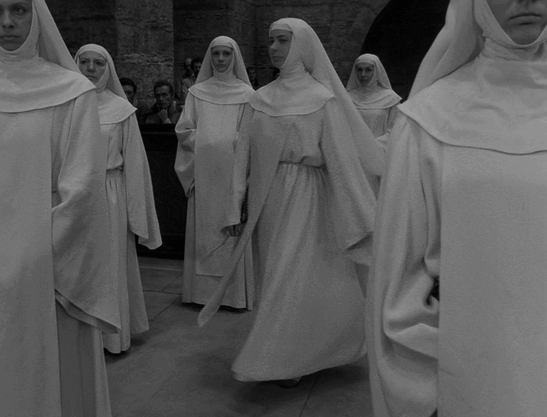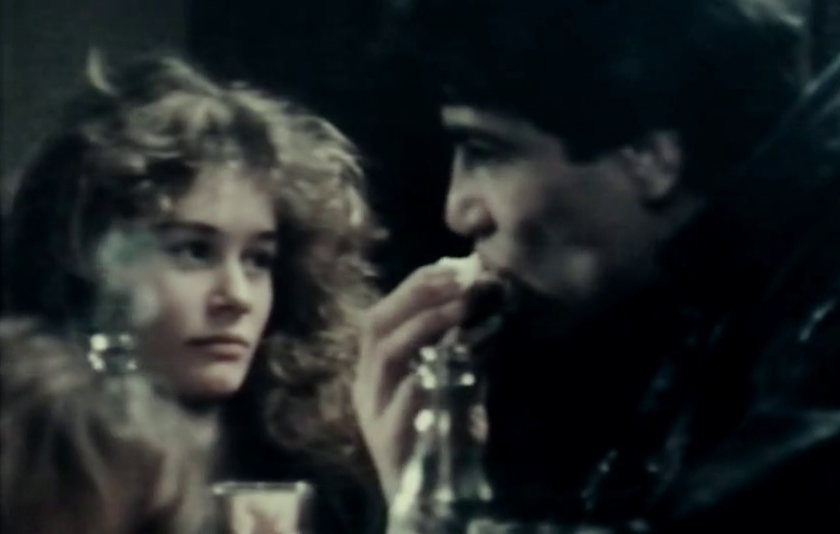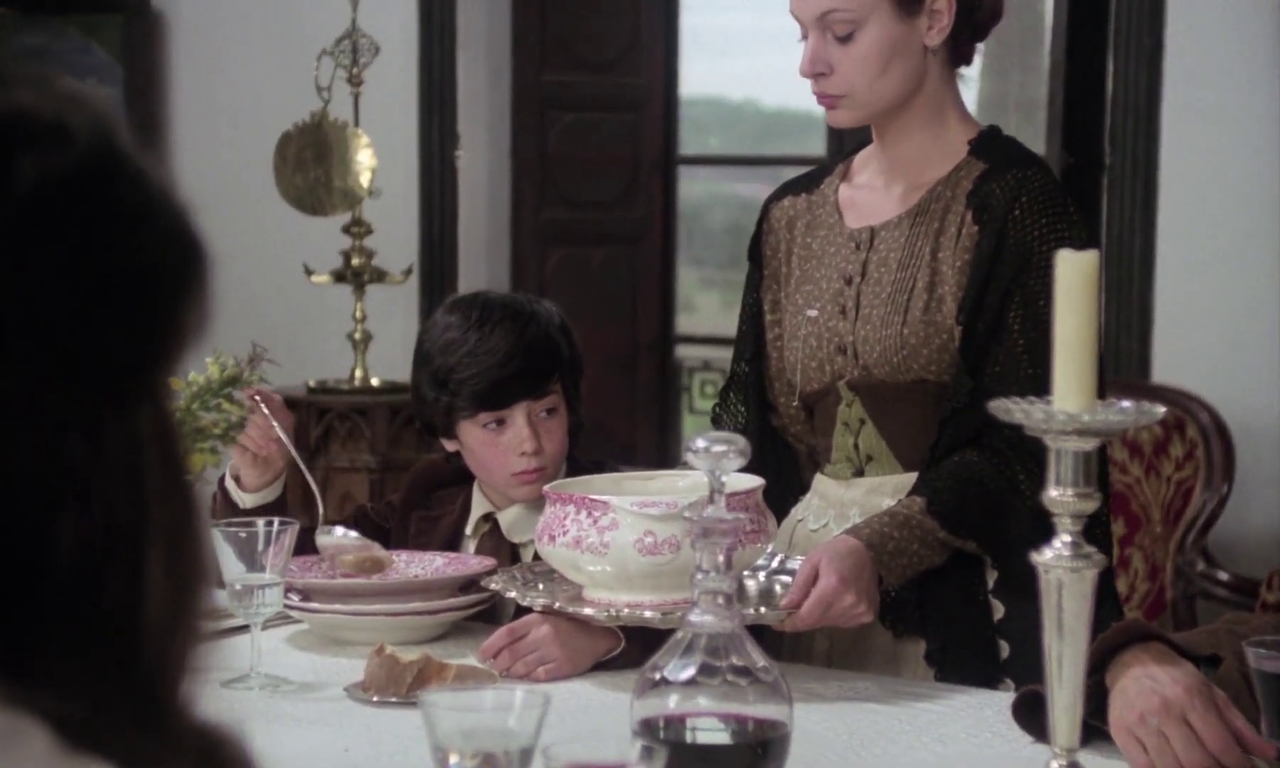“I'm glad that you came home. Do you understand? This is your home. You're no longer a wild boy, even if you're not yet a man.”L'enfant sauvage [The Wild Child] (François Truffaut, 1970)
Nov
14
Young Readers Day

Victor, the Wild Boy of Aveyron (Jean-Pierre Cargol), reads letters from a board under supervision of Dr. Jean Itard (Truffaut). DP: Néstor Almendros.
One of the most elaborately recorded “feral child” cases is that of the Wild Boy of Aveyron. In the year 1800, after few fruitless attempts to bound him to civilisation, a young boy left the forests of Saint-Sernin-sur-Rance and settled in. The child's primal appearance and lack of speech labeled him an idiot. However, in the era of Enlightenment, the question of nurture versus nature was a pressing one. Studies on Victor began.
– Dr. Itard
Truffaut explores L'enfant sauvage right when the idea of the noble savage seemed to lock on with counterculture. With #Truffaut as Victor's tutor Itard in front of the camera, directly guiding amateur child actor (and “gipsy”) Cargol, the film not only reimagines Victor's fate, but reenacts Western presumed enlightenment over The Other.
bookadaptation
“Their heritage of instability, extravagant caprice, and natural elegance was their paternal portion.”Les enfants terribles [The Terrible Children] (Jean-Pierre Melville, 1950)
Nov
13
World Orphans Day

The siblings – children on the cusp of adulthood, played by adults – sharing a bed. Elisabeth (Nicole Stéphane) points up towards the ceiling with one arm wrapped around her brother Paul's (Edouard Dermithe) neck. Both wear dressing gowns. DP: Henri Decaë.
With their mother bedridden, Elisabeth (Nicole Stéphane) nurtures her snowball-fight-injured brother Paul (Edouard Dermithe) back to health.
– Jean Cocteau, Les enfants terribles (1929)
Withdrawn in their family home, they form a strong manipulative bond, drawing others into their games.
“If one can't be saint, it's better to be damned.”Matka Joanna od Aniolów [Mother Joan of the Angels] (Jerzy Kawalerowicz, 1961)
Nov
9
Chaos Never Dies Day

A possessed nun in white spinning on her axis among her sisters. Black clad priests in the background observe the scene. DP: Jerzy Wójcik.
Four years after the tragic events at Loudun. Mother superior, the titular Mother Joan, is still possessed by the Devil and has slowly pulled in the other sisters. A priest, the fourth one, is send to the convent to exorcise the demons who at this point have possessed all but one sister. Chaos ensues.
– Mother Joan of the Angels
“Bacchus gives us his blood so we may be born again.”Seconds (John Frankenheimer, 1966)
Nov
7
International Merlot Day

Nora (Salome Jens), seen from the back with her dress half unzipped, holds up a glass of red wine while kissing a reluctant Antiochus (Rock Hudson) during the ecstatic Bacchanal scene. DP: James Wong Howe.
At a bacchanalia, Rock Hudson's Antiochus Wilson finally strips down his hesitancy and realises he has a second chance at life, as a member of the new generation. To the Queen of wine! To Bacchus! To Pan!
Director of photography James Wong Howe's very controlled framing of the (initially censored) pre-Woodstock #Bacchanalian scene beautifully frames this pinnacle moment and proved almost too much for American censors.
瘋癲老人日記 [Fūten rōjin nikki / Diary of a Mad Old Man] (Keigo Kimura, 1962)
Oct
29
World Stroke Day

Utsugi (Sō Yamamura) lusting after his daughter-in-law Sachiko's (Ayako Wakao) feet while she takes a shower. DP: Nobuo Munekawa.
“Nur ein leichtfertig Knechtlein, dem es gleichgültig war, regne oder sonnenscheine es in der Ernte, wenn nur das Jahr umging und der Lohn kam und zu jeder Essenszeit das Essen auf den Tisch, griff zum Löffel und berichtete Christine, daß noch keine Buche gepflanzet sei und alles gehe, als ob sie verhext wären.”Die schwarze Spinne [The Black Spider] (Mark M. Rissi, 1983)
Oct
20

Christine (Beatrice Kessler) and her junkie friends eating the old man's food. DP: Edwin Horak.
– Jeremias Gotthelf, Die schwarze Spinne (1842)
The Leather Boys (Sidney J. Furie, 1964)
Oct
17
National Motorcycle Ride Day

Pete (Dudley Sutton) in his black leather tiger jacket waiting for Reggie (Colin Campbell). He leans against a window pane while Reggie drives up. It's raining and Reg is merely a blur. DP: Gerald Gibbs.
Maciste all'inferno [Maciste in Hell] (Guido Brignone, 1925)
Oct
17
sinners

A demon eating a poor sinner. Numerous scenes are directly taken from Gustave Doré's illustrations of Dante's Divina Commedia, chapter Inferno. DPs: Ubaldo Arata, Massimo Terzano & Segundo de Chomón.
Beatriz (Gonzalo Suárez, 1976)
Oct
5
soup

Basilisa (Nadiuska) holds up a terrine for Juan (Óscar Martín), who scoops the soup into his bowl. The bowl is the top of three the small boy has towering in front of him. DP: Carlos Suárez.
Медвежья свадьба [Medvezhya svadba / The Bear's Wedding] (Konstantin Eggert + Vladimir Gardin, 1925)
Sep
28

In preparation of the bear's wedding, a cook – wearing not much more than an apron and a toque blanche – stirs a huge kettle over a roaring fire. DPs: Eduard Tisse & Pyotr Yermolov.